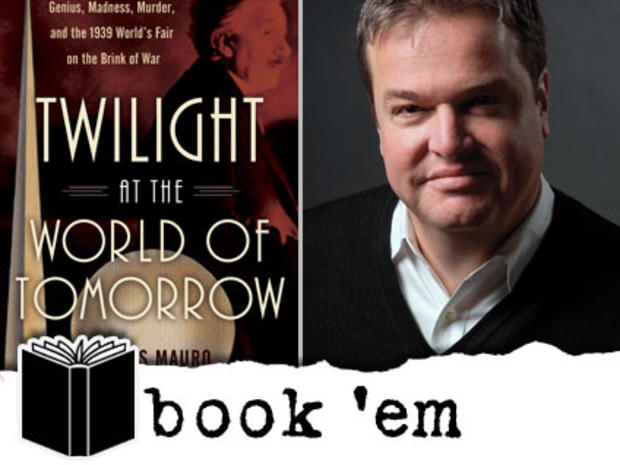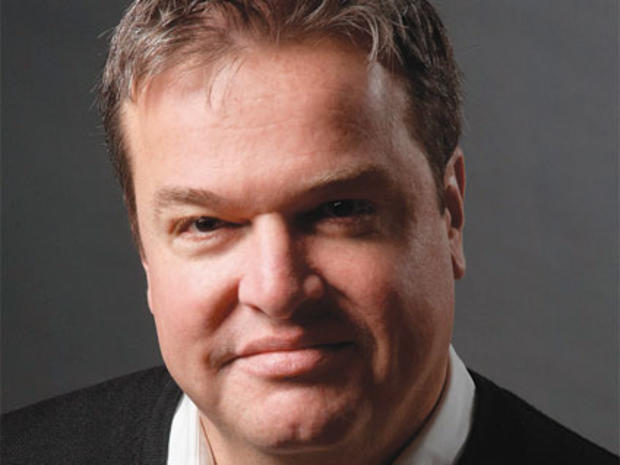Book 'Em: Twilight at the World of Tomorrow
NEW YORK (CBS) The summer of 1939 was an epic turning point for America. It marked a brief window between the Great Depression and World War II, a final season of unbridled hope for peace and prosperity before the Nazis invaded Poland. And nothing would come to symbolize the dramatic transition from acute optimism to fear and dread more than the 1939 New York World's Fair.
James Mauro decided to write TWILIGHT AT THE WORLD OF TOMORROW: Genius, Madness, Murder, and the 1939 World's Fair on the Brink of War when he came across a half-buried plaque in Flushing Meadows Corona Park in Queens, New York. The plaque was dedicated to two men who lost their lives 70 years ago on July 4, 1940 while attempting to diffuse a bomb that had been planted in the British Pavilion. It was an early example--maybe the earliest--of a terrorist act on American soil that was sponsored by a foreign power; and it probably would have killed hundreds of people if not for the intervention of two detectives. Yet Mauro had never heard the story, and he believed that was true of most people.
TWILIGHT AT THE WORLD OF TOMORROW encompasses that event and much more. Featuring a rich array of colorful characters, from Albert Einstein and Robert Moses to Fiorello LaGuardia and FDR, Mauro's narrative captures a larger story about a nation--and a world--poised precariously between the Great Depression and WWII.
Interview with James Mauro by Barry Leibowitz, Senior Writer at 48 Hours | Mystery
What drew you to this story?
Mauro: I've always been fascinated by the 1939 World's Fair. This idea of a World of Tomorrow built on an ash heap and poised directly between the Great Depression and WWII--something wonderful and fantastic that existed for two short summers and then disappeared completely--both in the actual buildings and in spirit. There was great hope when it began, despite the economic situation. And this dream city rose out of the dumps and captured the imaginations of its visitors and then was melted down into tools for war. I wanted to capture what it must have been like then--everything ahead of you, "nothing to fear," as FDR said. But then of course there was something to fear, and it became very real very quickly. But still--those two grand and glorious summers...
Can you summarize the sequence of events on the day of the bombing?
Mauro: An electrician, William Strachan, had been bothered by the sight of a suitcase sitting in a room that was off-limits to the general public for two days. On the second day, he leaned in for a closer look and discovered that it was ticking. Now, the tricky part here is that, in my opinion, he still didn't really consider the fact that it might have been a bomb. He thought there was a radio or something inside that was making the noise, so he carried it to his boss's office and asked what to do. Then they went in search of the chief of security, and all the while Strachan is carrying this time bomb through a crowded pavilion and thinking nothing of it. Finally someone decides to call the police, and they in turn send for the Bomb and Forgery Squad to decide what to do with it. In the meantime, the cops on duty, Bill Federer and Fred Morlach, carry the suitcase off to a remote area just in case.
Two detectives, Joe Lynch and Freddy Socha, examine the suitcase by cutting a small hole in the bottom. They see sticks of dynamite, and warn the surrounding officers to get back. "This looks like the real goods," Lynch says. And those are his last words, as the time bomb blows up in his and Socha's faces, killing them both. Four other officers are badly wounded, and the result is a very difficult decision for Mayor La Guardia: Do I close down the entire fairgrounds on the Fourth of July--in effect asking, "Do we back down to terrorism?" Or do we hope to God that this is an isolated incident and let the festivities continue. La Guardia decides not to mar the World's Fair, at least for the time being, with a panicky response. And the investigation begins.
What was the political climate in New York City in the run-up to the bombing and surrounding the World's Fair itself?
Mauro: There had been numerous bomb threats beginning in late 1939, after Germany invaded Poland and the "phony war" was over and the real one began. As many as four hundred written and telephoned threats came in every week. And then, in June 1940, two huge explosions ripped open office buildings in Lower Manhattan without any warning whatsoever. So there was a lot of tension, and growing fear that the United States would not be able to avoid war after all. Isolationism slowly began being replaced by reluctant acceptance of what was to come, but it didn't come easy. Although it may very well be that the World's Fair bomb brought the war to American shores a year and a half before Pearl Harbor. It certainly made it much more real as far as NYC was concerned.
What parallels are there between then and now, concerning terrorism?
Mauro: The parallels are numerous: create panic, attempt to cripple an economic symbol of American freedom, try to crush our spirits. By bombing something that was so quintessentially American--the New York World's Fair--the terrorists' message was clear: no one is safe, anywhere. About the only difference from the acts of today is that no one came forward to claim responsibility for the bomb. They couldn't. Retribution would have been swift and devastating. The world may be much smaller today than it was in 1940, but enemies tended to be in plain sight rather than moving targets of shadowy organizations. Still, the result was the same--neighbors looked at each other differently, suspicion was everywhere, and by remaining anonymous the terrorists could assume many identities: the Nazis, the Irish Republican Army, even Palestine. You didn't need to know exactly who the enemy was; you only needed to know that he was out there, and closer than anyone would have previously thought. Also, there was the realization that the United States was not invulnerable, as we so often like to think. And this drove a great wedge of doubt into the people of NY, just as the events of 9/11 did.
Why wasn't the World's Fair bombing more widely reported and remembered?
Mauro: This one puzzled me from the beginning. When I first stumbled on the plaque commemorating the event, I was shocked that I hadn't heard about it before. Then, when I started to research, I was absolutely floored that no one else did, either. The bomb was widely reported on the day after the event, but then coverage quickly went away. It's a great puzzle for which I can only speculate: 1. That the World's Fair itself was too great an undertaking to allow it to be clouded by the memory of only the bombing; and 2. That we knew who did it and for some reason decided to cover it up. The latter makes more sense to me--not any individual but an organization behind the bombing that we weren't yet ready to acknowledge as an enemy capable of pulling something like this off.
Why wasn't the case solved, and could it still be?
Mauro: Either for financial or political reasons, in my mind at least, there was a definite attempt to keep this thing quiet. And the result is that, to this day, people I speak to about the book still don't quite believe that a bomb went off at the World's Fair on the Fourth of July. But I have to say the conversations I had with certain detectives in the NYPD, who kept repeating the phrase, "But you didn't hear that from me" and would not go on the record or let me quote them even anonymously, leads me to believe that the case could still be solved if certain records were to be made public. Why, after all this time, there still exists a shroud of mystery about it, is anyone's guess.
BONUS QUESTION: What question should Crimesider have asked you that we didn't...and what's the answer?
Mauro: I think the only question remaining would be: What made Albert Einstein, the world's most famous pacifist, decide to write a letter to the president advocating the development of atomic weapons? I tried, in the book, to give an answer: that his dedication of the Palestine Pavilion, coming as it did so soon after the British White Paper limiting the number of Jews who could settle in Palestine, forced him to face the world in a way he never had to before. And I truly do believe that his involvement with the World's Fair, where he could see the living representations of his beloved Europe (i.e. the foreign pavilions) being taken over one by one by Hitler, brought it all home to him. Had he been ensconced in his study at Princeton, his emotions might not have been stirred to the point where he was going to be responsible (or share responsibility) for unleashing a terrible new weapon on the world.
About the Author
James Mauro is a former editor of Spy magazine and executive editor of Cosmopolitan. Most recently he was editorial director for Moffly Media, publishers of numerous Connecticut periodicals. His writing has been featured in Radar, Details, Spy, Psychology Today, and a host of other publications. He lives in Connecticut, where he is at work on his next book.

